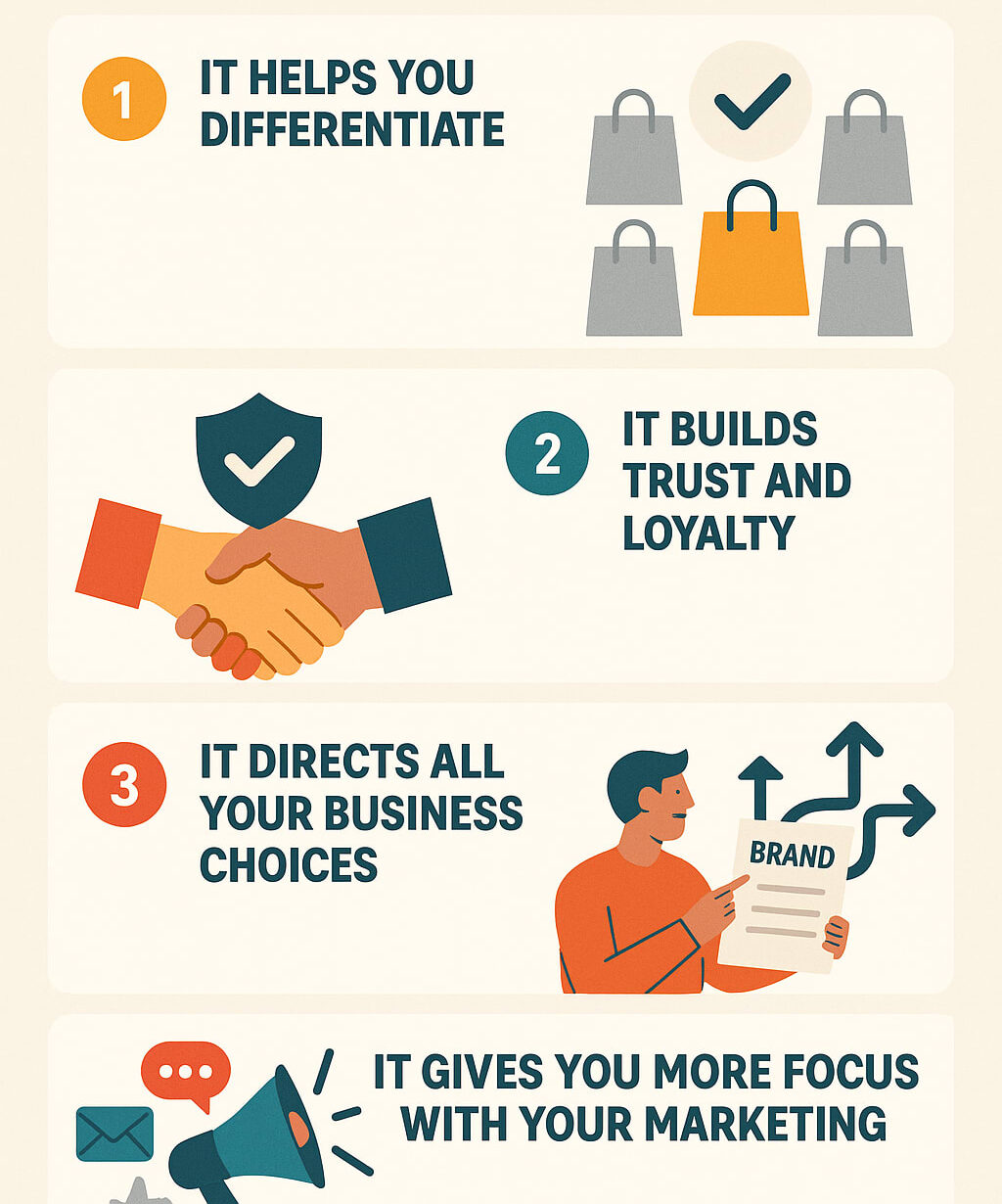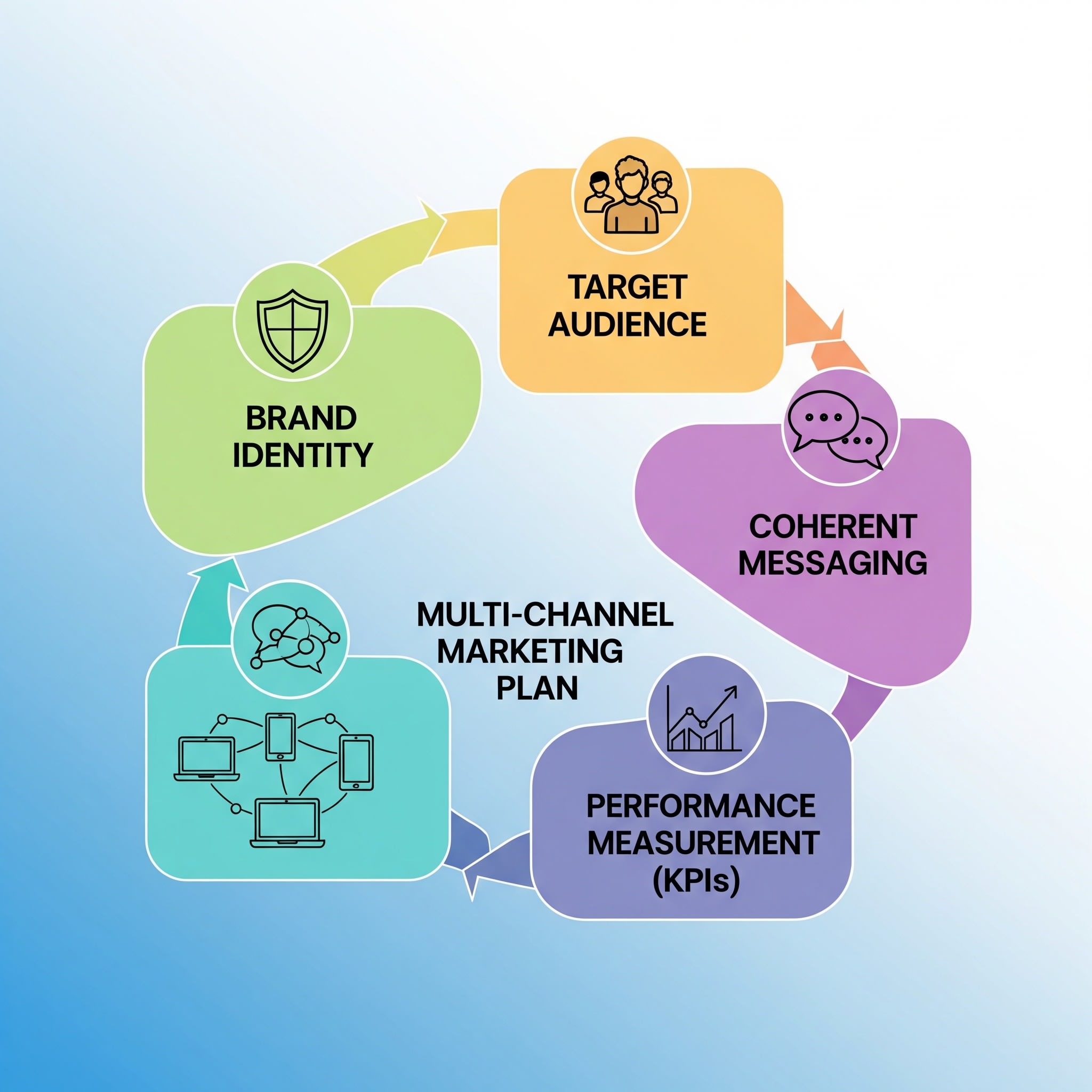Brand Marketing: What It Is & How to Create Your Strategy
Table of Contents

Imagine the product that you are selling is the most insignificant one. That is a brand-landed environment, and your brand is the game-changer! According to a recent study, 89% of consumers remain loyal to brands they share values with, which suggests that emotional connection trumps everything.
So, what is brand marketing? It is the systematic process of developing trust and recognition. This guide will answer what brand marketing means by showing that it is much more than a logo or a snappy tagline. In this “brand marketing” guide, we’ll walk through the necessary first step of brand definition marketing, how to develop a strong brand marketing strategy, and put it all together with brand marketing examples of successful brands. By the end of the guide, you will have a clear vision in place for building a brand that won’t only be noticed but remembered, trusted, and loved.
What is Brand Marketing? A Core Branding Meaning in Marketing
Brand marketing is the art of creating and advancing a relationship between individuals and brands. As opposed to selling a single product or service, brand marketing gives marketing of the entire bundle of the brand, and the brand employs these services and products as support or to demonstrate the brand promise. Brand marketing aims at creating value for the brand or company.
That is why all you should learn is that your brand is the image of your business. Neither your logo, your colours, nor your cool slogan. The reputation refers to what everyone thinks, says, and feels about your company when they hear of its name. The meaning of branding in the context of marketing involves being able to actively build and creatively communicate that reputation to the audience.
The Importance of a Brand Marketing Strategy in Your Business
The plans that you have in place to promote your brand are the map that gives directions. Advertisement is not a Brand Marketing Strategy. Plans also outline how you will develop the reputation of your brand and appear to the audience of your brand in the future.
Here are two reasons your brand marketing strategy is important:

1. It Helps You Differentiate
Your brand is what makes you different in a crowded marketplace. A brand marketing strategy helps you identify your uniqueness – your values, your voice, and your purpose. When you have a clearly defined brand, you become more than just a choice – you are the only best choice for customers to consider.
2. It Builds Trust and Loyalty
A consistent brand is a trusted brand. When your messaging, visuals, and customer experience are aligned every time, it allows the audience to know you are dependable. Over time, this consistency builds trust that helps shift one-time customers into loyal customers who advocate for your business.
3. It Directs All Your Business Choices
A brand strategy is not just a document for marketing. It is your company’s guide. It can tell you what to sell, who to hire, and how to behave with your customers. Every choice can be made against your brand purpose, helping you to not lose your brand identity.
4. It Gives You More Focus with Your Marketing
Without a strategy, your social, email campaigns, and ads are all separate offerings. A brand marketing strategy helps ensure that every single piece of content you generate works together to tell one compelling story. You can run even a small brand marketing campaign with more focus, more power, and more success.
To sum up, a brand marketing strategy is not an option. It is a “must-have” for sustainable growth. It elevates your business from a “bundling of products” to a brand with meaning, which people can relate to and have belief in.
Defining Your Brand: The First Step in Brand Marketing
You have to ask yourself a couple of questions about your business first before you take any steps to make a social media post, design a logo, or advertise. The first, most important thing is to define your brand.
Perceive your brand to be a human being. As people possess individual personalities, their group of values, and a goal in life, so does your brand. In the absence of this strong identity, your marketing will rely on chance and get lost to your audience because they will not be able to know who you are.
Brand definition involves some time investment to determine what a brand is. These are the key questions that you must have answers to:
What is Your Purpose? This is more than just making a profit. What is the mission/purpose of your brand? So, what do you do to solve the problem for your customers? Having a good sense of purpose will also provide meaning and relatability to what your brand is about.
What are Your Values? Your values are the things that lead to every decision that you take. Do you appreciate transparency, innovation, or community? Well-designed principles can also assist you in developing a genuine brand that customers will be able to trust and identify with.
Who is Your Audience? It is impossible to target everybody, and trying to do just that will make your message weak. You must have a clear idea of who and what you are speaking to, what their needs, interests, and challenges are. That enables you to talk to them directly in a resonant way.
What is Unique about You? This is your Unique Selling Proposition (USP). What is unique that you provide, which your competitors do not? Is it of higher quality, faster, or cheaper? Finding your position of strength will provide you with a strong message with which to base your marketing.
When you get these answers, you will be on solid ground. This brand is what will be the blueprint for all of your future marketing decisions. It will be making sure that your logo, your website, your Facebook, social media, and your customer service are all working to make one clear, one consistent story.
Key Components of a Successful Brand Marketing Strategy
It is not just an action to make a brand marketing strategy sail. It is a set of moving parts that would work harmoniously. One can consider it as a guide that informs all the contacts between a customer and your brand.
These are the main elements that you should develop to have an effective and strong brand marketing strategy:

1. Brand Identity: Your Appearance & Image
This is the brand’s aesthetics. It features your logo, your palette of colors, the fonts that you have, and makes up your overall visual appearance. However, it also carries your brand voice- your tone and words to use. An effective brand identity will make sure that whenever the client comes across your site, advertisement, or even social media post, they can immediately detect that it is yours.
2. Getting Deeply to Know Your Target Audience
You can never sell to everybody, which is why your approach should be laser-focused on the audience you wish to target. You should understand their requirements, what hurts, and what drives them. The more you know about your audience, the more effectively you will be able to generate a brand message that will resonate.
3. Brand Coherent Messaging
What is the essence of what you want to get across? The brand messaging is a commitment you give to your customers. This message should be uniform regarding communication through all the platforms, whether it is quality, convenience, or innovation. Being inconsistent, this will lead to confusion among the customers and mistrust, thus they will not believe in your core story.
4. A Multi-Channel Marketing Plan
This is because customers can now be found communicating with brands across a wide range of locations: social media, email, your website, podcasts, and the old media. Your plan must show where your connections are going to take place with your audience and the kind of content you are going to deliver on each platform. This helps you make sure that your brand presence is detectable and sets up shop where your customers are.
5. Indicating How Much You Do
What you do not measure, you cannot improve. An essential element of your plan has to be setting specific targets and measuring KPIs. This may consist of brand awareness (how many people know about you), customer engagement, website traffic, or sales. Consistently checking these figures will keep you in a position to tell what is working and change your strategy to achieve improved results.
When you combine all these elements, it makes a very solid, unified strategy that will make a sensation out of your business, something people will remember, believe, and come back to you time after time.
Brand Marketing Examples: How Top Companies Do It Right
To comprehend the strength of brand marketing, there is nothing better to look at than the brands we are familiar with. These businesses did not get rich by having the best product, but they created a powerful brand in which people can associate themselves at a higher level.
This is how select leading companies do it:
- Nike: A Brand, not a Pair of Shoes
One of the most renowned marketing strategies used in brand promotion is the slogan coined by Nike, and it is, Just Do it. Their approach does not pertain to selling shoes or sportswear but to selling an attitude of willpower, aspiration, and empowerment. Their advertisements hardly pinpoint the technical aspects of a shoe. Rather, they report excellent stories of athletes struggling with the odds.
The reason: Nike appeals to the emotional side of the customers. They have created a brand in which people wish to belong. When you purchase Nike, you are not purchasing a product; you are purchasing a lifestyle and a sense of promise.
- Apple: Creating a Simplistic and Innovative World
Apple has made the company a legendary brand based on two revolutionary concepts: simplicity and innovation. They are crisp and minimalist, and such a design can be found in all their products, stores, and advertisements. They do not get technical with their marketing campaigns, with the selling point of their products being how their products can streamline your life, unlock your creativity, and constantly connect you to the world.
Why it works: Apple created a whole ecosystem that offers a coherent and high-end experience. Customers become part of the brand through its usability value since using a product that works out of the box is satisfying. This develops unbelievable customer loyalty.
Measuring Success: How to Track Your Brand Marketing Efforts
Quite several companies feel that it is too fuzzy to measure brand marketing. They believe this has nothing to do with figures but sentiments and emotions. That is far not the case, though. Although you may not realize an immediate sale out of every brand campaign, it is paramount to quantify your efforts to have a sense of how healthy your brand could be and how you should take it in the future.
These are the main areas you must be monitoring when measuring the success of your marketing of your brand.
- Brand Awareness: Do People even Know You are around?
It is the simplest measure of success of the brand. Unless people know who you are, they can not buy anything from you.
Website Traffic: Analyse the direct traffic, i.e., traffic to your site by people keying in your URL directly in the browser. A high figure here implies that the people already know your brand name.
Social Media Reach & Mentions: Monitor the number of viewers of your content and mention your brand every time in the social media ranks. An increasing mention is an excellent indication that you are becoming a conversation.
Branded Search Volume: Use tools such as Google Trends to understand the number of searches associated with your brand name or goods in particular. When there is an upsurge in these searches, it means that more individuals are getting the know you.
- Brand Perception & Sentiment: What are they saying about you?
People must familiarize themselves with your name; however, they should also have a good perception of your brand.
Social Listening: Keep an eye on social media, forums, and review sites to look at what people are saying about you. Are the feedbacks positive, negative, or neutral overall?
Customer Surveys: Conduct basic surveys in which you ask questions such as, “When asked to think about our brand, what three words come to mind?” This gives you a first-hand view of how much customers think of you.
Online Reviews: Monitor your Google, Yelp, or industry-specific reviews and ratings. Excellent ratings are a vivid indicator of a good brand reputation.
- Customer Loyalty & Engagement: Do You Have Loyalty?
Brand marketing should be done to ensure the brand has loyal people who continue to come back.
Net Promoter Score (NPS): A basic but very potent measure. It presents the customers with a single survey question, on an index between 0-10, how likely are you to refer a friend to us? The high score means that customers are fervently loyal and promoters.
Repeat Purchases: Measure customer repeat purchases. A large repeat purchase behavior indicates that people understand and like your brand.
Customer Lifetime Value (CLV): This is the total value that one customer will bring to your business concerning his/her relationship with your company. High CLV has a good indication of customer loyalty.
Recording these metrics will help shift brand marketing from a calculable, “fuzzy” concept into a measurable, data-driven approach that is analyzable, leverageable, and can help you create an even more successful business.
Jaro Education – Helping You Make Confident Career Choices
Jaro Education is India’s number one edtech provider that empowers aspirational learners across India and has given thousands of students the confidence to make impactful career choices with an outstanding track record in delivering career counselling & programs from the top Universities across India. With a history of guiding 300,000+ students and working professionals, Jaro Education provides a combination of industry-endorsed courses with qualified career counsel in achieving personal and professional goals. Ultimately, the Jaro Education work requires assistance from an academic advisor with the following tools: personalized career assessments, access to professional mentors, tailored industry engagement, and career assistance. Moreover, Jaro Education has recorded a satisfaction rate of more than 90% of its students. Jaro Education proudly stands for perfectly guided decisions with even the most frictionless navigation to ultimately deliver the best transition to either a fresher or working professional, ultimately contributing to prolonged employment success for longer periods.
Conclusion
“In today’s marketing world, your brand is more than what you sell; it is the story you tell.”
In summary, brand marketing is more than logos and slogans. It is also about building trust, emotional connection, and lasting value. Brands that understand the brand definition in marketing, develop a brand marketing strategy, and look at brand marketing examples can create a great brand. Once you understand the branding meaning in marketing, you can start converting customers into ardent supporters.
Frequently Asked Questions
What is the key difference between brand marketing and the broader meaning of branding in marketing?
The key difference is action versus identity. Branding refers to the overall identity of your company—the feelings, values, and reputation people associate with you. It’s what you are. Brand marketing is the active process you use to communicate, build, and promote that identity. It’s the actions you take to shape your brand’s reputation, such as running a specific ad campaign, creating content, or engaging with customers on social media.
What are the first steps in creating a successful brand marketing strategy for a new business?
The first and most critical step is to define your brand’s core identity. Before you create any marketing materials, you must answer these questions:
What is your mission and purpose? (Your “why”)
Who is your target audience? (Your “who”)
What is your unique selling proposition (USP)? (Your “what makes you different”)
What is your brand’s voice and personality? (Your “how you talk”)
A successful strategy is built on this clear, well-defined foundation.
Can you provide some specific brand marketing examples and explain why they were successful?
Nike’s “Just Do It” campaign: This campaign succeeded because it wasn’t about selling shoes; it was about selling a mindset of determination and empowerment. It created an emotional connection with its audience, turning a product into a symbol of a lifestyle.
Why is a strong brand marketing strategy more important than just having good products?
A good product is the starting point, but a strong brand is what makes people choose you again and again. A strategy ensures that your great product is seen, remembered, and trusted. It’s your brand that differentiates you in a crowded market, creates customer loyalty, and builds the reputation that allows you to charge a premium. Without a strategy, a great product can easily get lost in the noise.
How does the definition of a brand impact a company's marketing decisions?
The definition of a brand acts as a compass for every marketing decision you make. If your brand is defined as being “playful and innovative,” you’ll create social media content that is witty and experimental, not stuffy and formal. Your brand definition dictates your color palette, your advertising tone, your content themes, and how you interact with your customers. It ensures that all your marketing efforts are consistent and reinforce the same core message.


















